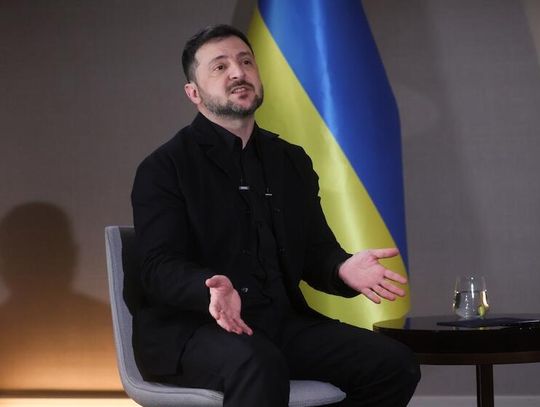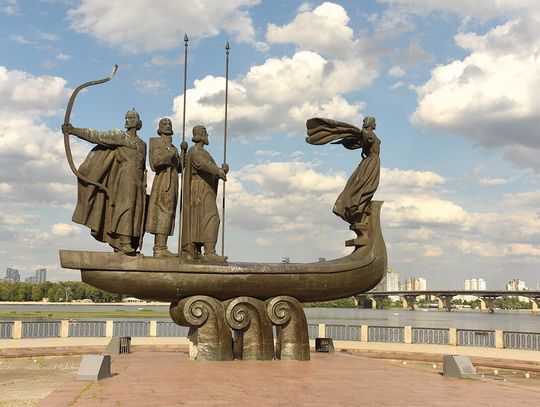Wybrałem się na forum polityczne zorganizowane przez młodych demokratów i republikanów. Wysłuchałem 16 polityków z obu partii, kobiet i mężczyzn startujących na rozmaite stanowiska, od radnego do kongresmena. Każdy z nich, oprócz jednego, rozpoczynał i kończył swoje przemówienie stwierdzeniem, że to Bóg nakazał im start w wyborach, a zdobyte stanowisko przysporzy dobra całej ludzkości.
Dwóch z tych kandydatów było nawet osobami duchownymi. Demokrata był pastorem Kościoła Episkopalnego, a republikanin – baptystą. Wszystkich ich łączyło jedno – mieli problemy ze zrozumieniem czytanego tekstu.:)
Nie bardzo widzę, w jaki sposób po przeczytaniu Nowego Testamentu uznać można, że Jezus pragnie, abyś poszedł do polityki, albo żebyś dołączył do któregoś z kościołów. Przeczytałem ostatnio książkę Garry'ego Willsa pt. „O co chodziło Jezusowi” (What Jesus Meant). Autor jest katolikiem, ale twierdzi, że w Nowym Testamencie, przynajmniej w czterech Ewangeliach, nie ma zgoła nic na temat zapisywania się do kościoła. Inni badacze Biblii są podobnego zdania.
Jeśli Jezus rzeczywiście chce czegoś od Ciebie, to żebyś był dobrym człowiekiem i pomagał innym. O tym mówił w Kazaniu na Górze. Do tego nie potrzeba chodzić do kościoła. Uważam wręcz, że Kościół jako struktura oparta na władzy i polityce, może stanowić przeszkodę w sprawach związanych z duszą.
Zostałem wychowany jako katolik, uczęszczałem do kościoła św. Fidelusa w pobliżu Humboldt Park. Kiedy spoglądam w przeszłość i przypominam sobie, czego mnie tam uczono, jestem zdumiony, jak niewiele z tych nauk było zgodne z nauczaniem Jezusa. Jeśli Jezusa uznać za literę A, a Kościół katolicki za literę Z, posługując się bądź to wiarą, bądź rozumem, trudno jest wyjaśnić, co A ma wspólnego z Z. W Kazaniu na Górze Jezus powiedział jasno i wyraźnie: „Jeśli uderzą Cię w twarz, nadstaw drugi policzek”.
Nie wydaje mi się, aby którykolwiek z mówców na forum politycznym, które odwiedziłem, wyznawał tę postawę. Prawdę mówiąc, myślę że wszyscy oni odrzucają nauki Jezusa, a skłaniają się raczej ku modelowi małżeństwa religii z polityką, jaki znamy ze Starego Testamentu. Wiecie o co mi chodzi? Że Ameryka jest jak Izrael – wojowniczym krajem prowadzonym przez Boga wściekłego na inne nacje.
Jeden z polityków występujących na forum powiedział coś bardzo interesującego. Że tam, gdzie jest wiara, nie ma miejsca na lęk. Pomyślałem – oto mądrość. Bo przecież Jezus nie mówił, żeby się bać. A ci kaznodzieje i politycy, których Bruce Springsteen w jednej ze swoich piosenek nazwał „pożeraczami dusz” mieszają Ci w głowie i przekonują, że należy bać się drugiego człowieka – prawdopodobnie odwalają czarcią robotę.
Koniec kazania.
Sermon on God and Politics
I went to a politicians forum here organized by the young Democrats and young Republicans and listened to 16 politicians, Dems and Republicans, men and women, running for offices ranging from city councilmen to US representatives, and all of these people except one began and ended their debates/speeches with a statement about how God had told them to pursue this office for the greater good of mankind.
Two of these guys, in fact, were ministers. One was a Democrat-Episcopalian, and the other a Republican-Baptist.
What they probably all really are is bad readers.
I can't see how you can read the New Testament and walk away thinking that Jesus wants you to go into politics, or for that matter, thinking that Jesus wants you to join a church.
I recently read a book called What Jesus Meant by Garry Wills--and his take on all of this (and he's a catholic) is that there is almost nothing in the NT (at least in the 4 gospels) that would have you honestly joining a church. And I've read bible scholars who have pretty much said the same thing (Elaine Pagels and Karen Armstrong).
If Jesus wants you to do anything, he wants you to be good and help people. See the Sermon on the Mount. You don't need a church for that. If anything, a church gets in the way, and also a church sets up a structure that is more about structure and power and politics and maintaining power than it is about anything that has to do with the soul.
I was brought up a Catholic (went to St. Fidelis Church near Humboldt Park) and I look back on the things I was taught and it's amazing how little of it came from the teachings of Jesus. If Jesus is point A, and the Catholic Church or any church is point Z, I don't think you can explain by either reason or faith how the one led to the other.
Jesus says in the Sermon on the Mount, as plain as plain can be: if they strike you in the face, turn the other cheek.
I don't think any of these preachers or politicians at the political forum I attended is advocating that. In fact, I think what all of them are advocating is a rejection of Jesus's teachings and an acceptance of a sort of vision of the marriage of politics and religion that you get in the old testament. You know what I mean, America as a sort of Israel, a warrior state with a God who's angry at other nations.
One of the preacher/politicans at this political forum said something very interesting. He said that where there is faith there is no need for fear. I thought: that's wisdom. I don't think Jesus ever teaches fear. And those politicians and preachers (what Bruce Springsteen in one his song calls "those soul sucking preachers”) who get you worked up with fear and teach you to be afraid of other people and other countries are in fact probably doing the devil's work.
End of sermon.
John Guzlowski
amerykański pisarz i poeta polskiego pochodzenia. Publikował w wielu pismach literackich, zarówno w USA, jak i za granicą, m.in. w „Writer’s Almanac”, „Akcent”, „Ontario Review” i „North American Review”. Jego wiersze i eseje opisujące przeżycia jego rodziców – robotników przymusowych w nazistowskich Niemczech oraz uchodźców wojennych, którzy emigrowali do Chicago – ukazały się we wspomnieniowym tomie pt. „Echoes of Tattered Tongues”. W 2017 roku książka ta zdobyła nagrodę poetycką im. Benjamina Franklina oraz nagrodę literacką Erica Hoffera, za najbardziej prowokującą do myślenia książkę roku. Jest również autorem dwóch powieści kryminalnych o detektywie Hanku Purcellu oraz powieści wojennej pt. „Road of Bones”. John Guzlowski jest emerytowanym profesorem Eastern Illinois University.
—
John Guzlowski's writing has been featured in Garrison Keillor’s Writer’s Almanac, Akcent, Ontario Review, North American Review, and other journals here and abroad. His poems and personal essays about his Polish parents’ experiences as slave laborers in Nazi Germany and refugees in Chicago appear in his memoir Echoes of Tattered Tongues. Echoes received the 2017 Benjamin Franklin Poetry Award and the Eric Hoffer Foundation's Montaigne Award for most thought-provoking book of the year. He is also the author of two Hank Purcell mysteries and the war novel Road of Bones. Guzlowski is a Professor Emeritus at Eastern Illinois University.
fot.pxhere.com
Więcej o autorze / autorach:
Reklama











